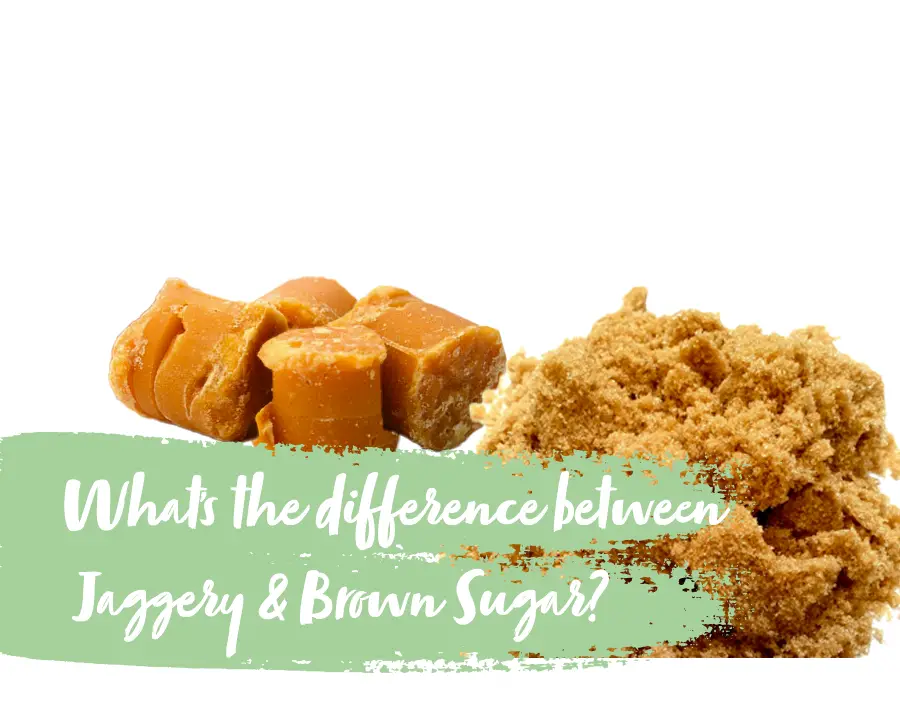What is jaggery? Visit any store and you’ll find the shelves stocked with different types of sugar – from beet sugar to white sugar, coconut sugar, demerara sugar, dark muscovado sugar and…jaggery! But why has jaggery suddenly become more popular than brown sugar? Is it because it’s a more natural cane sugar substance that sweetens in a lighter and more healthy way?
What is jaggery and why is the difference between jaggery and brown sugar of interest to so many? Health aficionados, curious foodies and home bakers prefer using jaggery as a healthier replacement for brown sugar, white sugar and other refined sugar related products.
Below we look at the comparisons between brown sugar and jaggery to help you determine whether jaggery is a suitable alternative in fudge making recipes. We’ve also looked at Can I Use Caster Sugar Instead Of Granulated In Fudge?.
What is jaggery?
Jaggery is a natural sweetener that hasn’t undergone refinement. It’s a sugar that’s traditionally in use in Southeast Asia, India and Africa. People in these areas think of it as a superfood sweetener because of its vitamin and mineral content and its lower level of sucrose, which makes eating jaggery comparatively healthier than regular sugar.
This natural sweetener is made from raw, unrefined sugar cane juice. The processing involves evaporating water from the juice of the sugar cane.
Molasses and crystals remain within the jaggery. They can also make jaggery from date, palm or coconut sap. Its color varies from light to a golden brown to a dark jaggery, which is because of the type of sugar cane they use and the juice it produces and comes in either a powdered or granulated form.
In terms of taste, some describe it as being slightly less sweet than maple syrup, whilst others claim it is a mouth watering mixture of spicy molasses and toffee sauce. Either way, this substitute brown sugar is a taste sensation.
What are the benefits of jaggery?
There are many healthy benefits of jaggery. It contains protein, some B vitamins, calcium, folate, phosphorus, selenium, iron, magnesium, betaine, choline and manganese.
There is no fat, though the sugar content is such that diabetic patients should avoid it; however, it contains antioxidant and anticarcinogenic features and helps with digestion.
Jaggery has also been claimed to increase energy levels, relieves stress and combats lung and bronchial infections along with constipation, joint pain discomfort, body temperature regulation, liver and blood cleansing, and premenstrual syndrome.
What are the disadvantages of jaggery?
With overconsumption of jaggery, it’s easy to gain weight and if you’re inclined to inflammation throughout your body, you’ll want to avoid it.
It’s not recommended for those who have ulcerative colitis and it is an at risk substance for those with allergies, cardiovascular disease, fatty liver disease and certain cancers. You see risks of parasitic infections with the use of jaggery and those who are diabetic need to know that consumption in excess can lead to serious issues.
What is brown sugar?
In comparison, brown sugar is an unrefined or partially processed sugar that is soft and contains sugar crystals with the rest in molasses content. You can also make it with the addition of molasses that’s added to refined white sugar.
What are the benefits of brown sugar?
Brown sugar has a lower caloric content compared to its white sugar counterpart. In addition, it’s slightly higher in micronutrients because of the molasses component that includes calcium, iron and potassium. Other micronutrients include zinc, copper, phosphorous and vitamin B-6. The nutritional value is very slight and is not enough to provide true health benefits.
The molasses in brown sugar is beneficial for cooking fudge, as it adds moisture and thickness along with a buttery caramel taste.
In comparison, regular sugar has a sweeter taste and less is required concerning the sweetness factor. It’s used in sponge cakes, sweet pastries and cookies and brings a lighter but sweeter taste.
What are the disadvantages of brown sugar?
With brown sugar, you get the same side effects as white sugar concerning your health. Continuous use of brown sugar leads to the risk of obesity and weight gain, diabetes, heart issues, inflammation, and other serious health conditions.
Consuming it occasionally won’t destroy your health, though you will want to avoid it as a staple in your diet.
What is the difference between jaggery and brown sugar?
The difference between jaggery and brown sugar is in the making of the sweeteners. With brown sugar, you mix refined sugar and a reserved amount of molasses. You make jaggery using sugar cane juice or palm sap. The juice, through reduction, gives a pasty consistency to the sugar, and it’s set in molds to harden.
Jaggery is also darker and less sweet and its mineral content gives it a distinct taste. When you need to substitute jaggery in a recipe that calls for darker sugar, you’ll need to add more jaggery to arrive at the same level of sweetness.
Another difference between the two is the nutritional value. Though they are similar in total calories, jaggery contains iron and other minerals, which make it a healthier alternative. It’s more suitable for those trying to stay healthy and get away from the empty calories of sugar, whether brown or white.
Can I substitute jaggery for brown sugar?
Jaggery is an excellent substitute for brown sugar in different recipes, including fudge, and as a simple candy treat or topping on desserts.
You just have to be aware that you may need to do some readjusting with the jaggery quantities in the recipes you choose. This is because jaggery contains considerably more moisture than regular brown sugar and the moisture content of jaggery varies from brand to brand. That aspect of it can make it unpredictable when baking fudge, but it’s not impossible. The more pliable the jaggery is, the more moisture it contains.
If you’ve never used jaggery before then you may need to experiment to understand its uses and how sweet it is. It would be a good idea to search for recipes which use jaggery as a sugar source directly.
Which is more harmful sugar or jaggery?
Though the two are similar in caloric content, brown sugar will be the more harmful. The consistent use of it every day can affect your health, particularly in large amounts.
FAQs – Jaggery vs brown sugar
Why jaggery is more expensive than sugar?
Jaggery is more expensive than white sugar because of the demand for it. People in need of it or who use it regularly will pay more for a bag of jaggery.
Also, the production costs of jaggery are higher because of the use of old technology in its manufacturing process. In addition, there are no byproducts used in its production, so the price remains higher. Both wholesalers and retailers keep a large supply of jaggery in stock, so it moves slower than regular sugar would, which keeps the price at a premium.
Does jaggery expire?
Both white sugar and jaggery never expire, although it does depends on the conditions under which you store them. When jaggery faces exposure to water or it gets extremely moist or warm, then mold can develop on it which makes it uneatable.
Both sugar and jaggery, if kept in cool (to cold) and dry conditions, won’t expire.
Can jaggery be used instead of brown sugar in cake?
You can use the granular form of jaggery in cakes. It’s healthier than brown sugar and sweetens naturally. As its rich in different minerals such as iron, calcium, magnesium, potassium and phosphorous, it brings both a healthy aspect to baking fudge and a crispy, crunchy texture.
If you simply need an added finishing touch, muscovado sugar is an excellent substitute as it’s a cane sugar product (unrefined) that contains natural molasses. It, too, has a brown color and a taste similar to toffee. Think of muscovado sugar as an artisanal sugar that’s made through more intensive methods than white or brown sugar.
Can you bake with jaggery?
Yes, you can. Baking anything, including fudge, with jaggery is a healthier substitute and a sweeter option. You’ll just have to readjust the amount of jaggery you use in different recipes to achieve a taste and consistency that is more in line with regular sugar. It brings moistness, flavor, sweetness and a dark color to most things that you bake.
The differences with jaggery and brown sugar are in their manufacturing process, their nutritional value, their overall taste and their effectiveness in the baking process.
In Summary
When it comes to choosing your ingredients for fudge making, then jaggery has many advantages its over brown sugar rival. It’s a healthier substitute for sugar, as it contains important vitamins and minerals through its molasses component.
So, if you’re serious about improving your health, and you want to decrease your intake of sugar, using jaggery is a good option as it has nutritional value, is less sweet and has a good yet different taste. One thing to remember, however, is that any sugar product requires modification in use.
Curious about brown sugar fudge? Why not try these:


